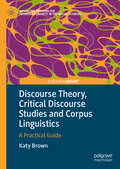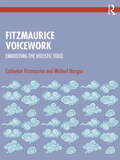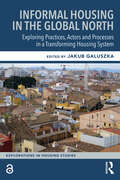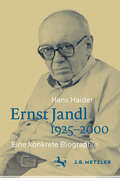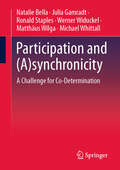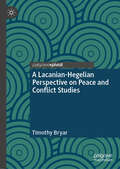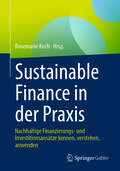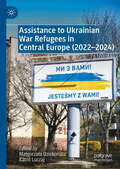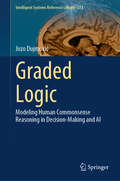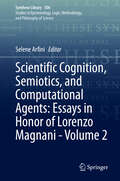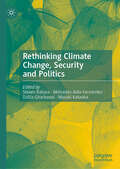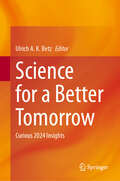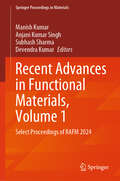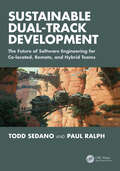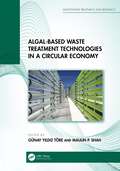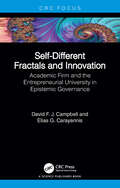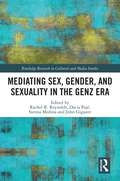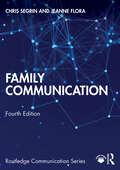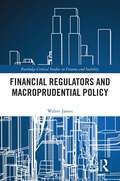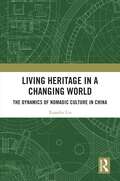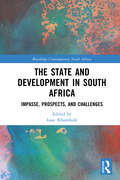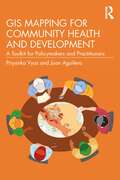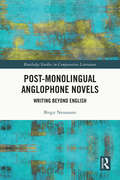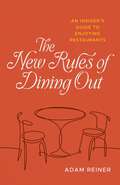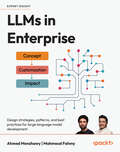- Table View
- List View
Discourse Theory, Critical Discourse Studies and Corpus Linguistics: A Practical Guide (Advancing Methods for Interdisciplinarity in the Social Sciences)
by Katy BrownThis book provides a practical guide to a novel framework combining three diverse traditions within the field of discourse studies: Poststructuralist Discourse Theory, Critical Discourse Studies and Corpus Linguistics. By first covering a philosophical and conceptual overview to illustrate their compatibility, followed by detailed steps for applying them analytically within research projects, it offers an accessible framework for researchers and students interested in mixed-methods approaches to discourse analysis. The way that the book introduces both the core components of each tradition and a comprehensive framework for their amalgamation means that it will strongly interest both newcomers to the field and more experienced discourse analysts. The piece aims to act as a stimulus for greater dialogue between the traditions and to encourage further development of this unique combination of methodologies.
Fitzmaurice Voicework: Embodying the Holistic Voice
by Michael Morgan Catherine FitzmauriceFitzmaurice Voicework: Embodying the Holistic Voice is the ultimate guide to a world-renowned voice approach for discovering and developing the voice's full expressive potential and healthy use. Catherine Fitzmaurice, the originator of the Fitzmaurice Voicework approach, and Michael Morgan bring together over 60 years of original, class-tested exercises and concepts. Detailed instructions, anecdotes, and visuals are used to create an immersive, student-centered learning experience. The book rethinks short- and long-term tensions, mental barriers, and stage fright, providing self-empowering and compassionate ways to enhance vocal abilities for clearer communication, more vocal variety, and meeting vocal performance demands. The authors describe a voice technology that holistically strengthens the speaker's ability to synthesize sensations, emotions, and reflexes with mental decisions. This is done through exercises that elicit the power of the autonomic and central nervous systems through a multi-layered integrative mind/body/breath approach and introducing the innovative Destructuring/Restructuring process. Fitzmaurice Voicework is about creating meaning that considers one's entire humanity.Acting students and voice teachers will find this insightful and unique volume to be an invaluable resource. It also helps actors, voiceover artists, singers, public speakers, and anybody else develop their expressive and communication skills. It's for people who desire to speak more clearly, spontaneously, authentically, and decisively.
Informal Housing in the Global North: Exploring Practices, Actors and Processes in a Transforming Housing System (Explorations in Housing Studies)
by Jakub GaluszkaInformal Housing in the Global North proposes analytical and conceptual approaches to investigate the progressing ‘informalisation’ of contemporary housing in the Global North and beyond.Amidst the ongoing housing crisis, the reading of informalities in the so-called North has increasingly disrupted the conventional understanding of local cities as fully regulated, well-structured and formal. By juxtaposing contested, successful and ‘under- the- radar’ ordinary housing phenomena across various income levels, this volume seeks to unpack and document the embeddedness of informality in mid- and high-income cities. This investigation reveals the pervasive and hybrid nature of local housing systems, in which formal frameworks defining modes of utilising spaces and architectural design are continuously reinterpreted by users, public sector actors and market entities alike. It reflects on everyday housing pathways and the agency of those who, by preference or necessity, engage with solutions conventionally labelled as informal.This book will be of interest to scholars and students of housing studies, planning, architecture and urban sociology as well as practitioners working in the field of housing.
Ernst Jandl 1925–2000: Eine konkrete Biographie
by Hans HaiderErnst Jandl (1925–2000) gehört zu den wichtigsten Lyrikern des 20. Jahrhunderts. Mit Lettern- und Lautgedichten machte er sich in den 1950er Jahren in seiner Heimat Wien zum Außenseiter, fand jedoch rasch Anerkennung in den Zentren der Konkreten Poesie in Stuttgart, Prag, London. Wie ein Popstar entführte er bei lautstarken Auftritten die Jugend der Revolte-Generation mit Sprachwitz und -spiel in die Schmerzbezirke von Krieg, absurdem Alltag, Liebesdefizit. Er setzte dem hohen Ton eine „heruntergekommene“ Sprache und unterkühlten Dialekt entgegen. Mit der Lebenspartnerin Friederike Mayröcker schuf er Pionierwerke des ‚Neuen Hörspiels‘. Hans Haider legt nach Archivrecherchen in halb Europa und jahrzehntelanger Tätigkeit in der Wiener Kulturszene als Kritiker und Herausgeber die erste umfassende Jandl-Biographie vor.
Participation and (A)synchronicity: A Challenge for Co-Determination
by Ronald Staples Werner Widuckel Michael Whittall Natalie Bella Julia Gamradt Matthäus WilgaThe book addresses digital transformation in companies and examines the changes for workplace stakeholders. The focus is on how co-determination interacts with digital transformation. This also puts a transformation of co-determination itself on the agenda, during which the direct participation of employees expands significantly in the interest-political positioning of works councils. Moreover, participation becomes a strategic resource for co-determination.
A Lacanian-Hegelian Perspective on Peace and Conflict Studies (Rethinking Peace and Conflict Studies)
by Timothy BryarThis book takes a ground-breaking approach to peace theory and practice at a time of multiplying global crises. It draws on the Lacanian-Hegelian dialectical materialism to rethink the way we think peace, conflict and violence as amongst multiple, overlapping crises including climate change, contemporary conflict, the threat of nuclear war, pandemics, the rise of far-right racism and growing class divisions. Such an approach may seem surprising. While Lacanian-Hegelian scholars have provided analyses of contemporary conflicts including Russia&’s war on Ukraine and Israel&’s war against Hamas, in doing so they have also made pointedly critiqued the theory and practice of peace. Rather than simply defend peace theory and practice, the book uses these critiques as the basis for rethinking peace and conflict. Therefore, the book occupies a unique position by being the first to apply Lacanian-Hegelian dialectical materialism to peace and conflict theory and practice broadlyIn doing so, it provides scholars, students and practitioners with new concepts and tools to rethink peace theory and practice – and to engage with politics in an age fraught with crises.
Sustainable Finance in der Praxis: Nachhaltige Finanzierungs- und Investitionsansätze kennen, verstehen, anwenden
by Rosemarie KochBei Sustainable Finance geht es darum, Nachhaltigkeitsaspekte – also ökonomische, ökologische und soziale Gesichtspunkte – in finanzielle Entscheidungen einzubinden. Dies wirft sowohl für die wissenschaftliche Betrachtung als auch für die Praxis Fragen auf. Theoretisch fundiert, vor allem aber mit konkreter praxisbezogener Ausrichtung, geht dieses Buch diesen Fragen nach. Es richtet sich an Wissenschaftlerinnen und Wissenschaftler sowie an Praktikerinnen und Praktiker, die einen Überblick über die neuen nachhaltigen Ansätze in der Unternehmensfinanzierung sowie im Bankensektor gewinnen möchten. Privatanlegerinnen und Privatanlegern hilft das Herausgeberwerk, nachhaltige Anlageoptionen kennenzulernen und zu verstehen. Neben Fallstudien berücksichtigt das Buch exklusive Experteninterviews mit Fachleuten aus Banken und DAX-40-Unternehmen, die wertvolle Einblicke in die gegenwärtige Umsetzung nachhaltiger Finanzstrategien in der Wirtschaft gewähren.
Assistance to Ukrainian War Refugees in Central Europe (2022-2024)
by Małgorzata Dziekońska Kamil LuczajThis book offers a comprehensive analysis of the unprecedented situation following the later stages of the war in Ukraine in 2022. It explores the experiences of millions of Ukrainians who sought refuge in neighboring countries and examines the wide-ranging support they received. Focusing primarily on Poland, Czechia, Slovakia, and Moldova, the book highlights both the assistance provided by these nations and the personal stories of those who benefited from it. Based on qualitative research, including interviews and discourse analysis, and complemented by an examination of governmental documents and organizational initiatives, this work provides an in-depth account of the efforts made to support those displaced by the conflict. This book will be of interest to academics and practitioners within the NGO and government sectors actively researching Ukrainian refugees in countries that have chosen to host larger numbers of Ukrainians, particularly in Europe and North America.
Graded Logic: Modeling Human Commonsense Reasoning in Decision-Making and AI (Intelligent Systems Reference Library #273)
by Jozo DujmovićObservable human commonsense reasoning can be modeled with graded propositional logic. Our approach is distinctive in that all mathematical models are directly linked to specific, observable, and explainable mental activities. Decision-makers evaluate alternatives through perceived gradations of truth, importance, suitability, simultaneity, and substitutability. Each graded variable has a semantic identity, reflecting its role and meaning tied to the goals and interests of a specific decision-maker. Graded logic was introduced 50 years ago, and this book presents its current status based on a half-century of improvements and applications. The book includes examples of decision problems solved using graded logic models. Our aim is to provide readers with a solid theoretical foundation in graded propositional calculus, enabling them to confidently apply the LSP method on complex evaluation and decision problems. Additionally, the book suggests numerous directions for future research and applications.
Scientific Cognition, Semiotics, and Computational Agents: Essays in Honor of Lorenzo Magnani - Volume 2 (Synthese Library #506)
by Selene ArfiniThis book, the second of two volumes, focuses on scientific cognition, computationalism, and scholars' reception of what Lorenzo Magnani named "eco-cognitive" views on the mind. The authors of these chapters address complex questions, which regard, in part, Magnani’s contributions in the field of model-based science, the role of inferential models in mathematics, the transformations and possible applicability of Charles Sanders Peirce’s and Immanuel Kant’s concepts and insight into current understanding of scientific progress, and the still unsolved questions regarding the methodological steps that take researchers to scientific discoveries. Some contributions also address the problematic understanding of artificial agents as "intelligent," how cognition can be discussed within the limits of computationalism, and how the eco-cognitive perspective on the mind also affects the conception of scientific reasoning and socially constructed phenomena. The book is of great interest to those interested in epistemology, philosophy of science, mathematical logic and AI.
Rethinking Climate Change, Security and Politics
by Steven Ratuva Mercedes Alda-Fernández Dalila Gharbaoui Masaki KataokaThe book provides a critical analysis of the nexus between climate change, security and politics, especially in relation to the role and impact of societal agencies such as states, corporations, military, financial institutions and community organizations in framing and responding to climate change using various forms of social, economic or political leverage. Climate change is a major existential security threat to the planet and humanity, yet there is continuing debate as to how it should be approached.
Science for a Better Tomorrow: Curious 2024 Insights
by Ulrich A. K. BetzThis book explores the intersection of biosciences, artificial intelligence (AI), and information technology (IT), highlighting their potential to drive innovation in biomedicine and health, particularly in the context of pandemic resiliency and human longevity. The book expands on the discussion held at the Curious2024 – Future Insight Conference, capturing the innovative spirit and collaborative ethos of the conference. In this book, readers will find a diverse array of topics, including individualized medicine for cardiovascular disease, the sustainable transformation of chemical processes, and the future of drug discovery through an AI-driven lens. The book also investigates the role of synthetic biology in leveraging the ground truth of intelligence and explores the potential of developing conscious service robots. Chapters written by keynote speakers from the Curious2024 – Future Insight Conference emphasize the importance of interdisciplinary and transdisciplinary dialogue for breakthrough innovation. These contributions also provide a comprehensive analysis of the challenges and opportunities that lie ahead, making this book an essential read for those interested in the future of science and technology. By highlighting the crucial role of scientists in solving today's problems and enabling the dreams of a better tomorrow, the book appeals to a broad readership of researchers, scholars, and practitioners in biosciences, AI, and IT. It also serves as a valuable resource for early career researchers seeking mentorship and guidance.
Recent Advances in Functional Materials, Volume 1: Select Proceedings of RAFM 2024 (Springer Proceedings in Materials #68)
by Manish Kumar Devendra Kumar Anjani Kumar Singh Subhash SharmaThis volume presents the select proceedings of International Conference on Recent Advances in Functional Materials (RAFM 2024). It covers a wide range of topics such as multifunctional materials, 2D materials, biomaterials, materials for environmental studies, DFT and solar simulation of materials, perovskite and double perovskite materials, luminescent materials, smart materials, materials for energy conversion and storage, smart materials, advanced functional materials, polymeric materials, composites, liquid crystals, materials for sustainable development, nanomaterials and thin films, smart devices and quantum dots synthesis technique, and characterization tools with application in smart devices. The book will be useful for researchers and professionals working in various areas of materials science.
Sustainable Dual-Track Development: The Future of Software Engineering for Co-located, Remote, and Hybrid Teams
by Todd Sedano Paul RalphEvery decade or so, the software development community reinvents itself to address the dominant problems of the day. Agile methods reacted against slow, bureaucratic, documentation driven development. The next big shift reacts against unsustainable development practices. This book advances dual-track development as a unifying framework for the best way of designing great products (user-centered design), the best way of delivering software efficiently (agile methods), and strategies for balancing present and future needs (sustainable development). This book does not just recommend practices. It explains how to implement practices and the surprising science behind the practices, in an approachable, sometimes cheeky style. You won’t find a “Dual-track Master” telling you that you must do it exactly this way, otherwise you’re a sellout. Rather, this book describes a set of sociotechnical tools and gives advice for adapting these tools to your unique context.Welcome to the future of software engineering that you actually want: one that embracesclean code, hyper-productive programming, belongingness, empathy, environmental sustainability, economic feasibility, pro-social impact, and organizational justice.Todd Sedano, PhD (Carnegie Mellon University), enjoys creating inclusive engineering environments, empowering others to excel, and coaching others by listening and reframing from a growth mindset. He has more than 25 years of experience as a software engineer and engineering manager at leading organizations including NASA JPL, Pivotal Labs, VMware, Enjoy, Gusto, and ID.me. Todd has published scholarly articles on software development waste, agile teams, product backlogs, and dual-track development. His academic research became the foundation for this book. His current hobbies include riding roller coasters, improvisational theater, and American Kenpo. D. Paul Ralph, PhD (British Columbia), is an award-winning scientist, author, consultant, professor of Software Engineering and director of the Dalhousie Software Engineering Lab. His cutting-edge research at the intersection of software engineering, human-computer interaction, and project management investigates how to improve the environmental, social, economic, and technical sustainability of software development. Paul’s previous research has been published in over 100 peer-review articles and has been used by leading technology companies including Adobe, Amazon, AT&T, Canon, IBM, Google, HP, Microsoft, Netflix, Oracle, PayPal, Samsung, Salesforce, VMware, Yahoo!, and Walmart.
Algal-based Waste Treatment Technologies in a Circular Economy (Wastewater Treatment and Research)
by Maulin P. Shah Günay Yıldız TöreIn recent years, problems such as environmental pollution, global warming, and high energy consumption have brought waste treatment technologies to the forefront. As the scientific world turns to sustainable, environmentally friendly, and ecologically sound energy sources, microalgae-based technologies have become one of the most intensely studied subjects in academia. This book delves deeper into the emergence of microalgae as the green alternative that could lead the world toward adopting a circular economy and zero-discharge approach.With insights from professors and industry experts in the field, this book provides new perspectives on the day-to-day environmental applications of microalgal technologies in waste treatment and management as well as recycling. It also explores the environmental impact of traditional waste treatment and recovery technologies and highlights how algae-based technologies can serve as an eco-friendly alternative in microplastic removal and biofuel production. This book equips readers with the essential knowledge on algae-based phycoremediation technologies, with special emphasis on their use in conventional treatment facilities to remove harmful contaminants and stabilize pH for effective bacterial treatment.This is a valuable resource for environmentalists, scientists, and technologists around the world. It will also be of interest to academics and students within the disciplines of Phycology, Water Systems Engineering, Environmental Science and Remediation, and Sustainable Development.
Self-Different Fractals and Innovation: Academic Firm and the Entrepreneurial University in Epistemic Governance
by Elias G. Carayannis David F. CampbellThe presented ideas create and shape the vision of a “Manifesto of Higher Education Governance”.Fractals are typically understood as self-similar structures, but this concept is expanded to include “self-different fractals”. These fractals align with a “Philosophy of Dialectics”, where opposing forces (thesis and antithesis) can either create disruption or, when managed effectively, drive creativity, innovation, and development. Because self-different fractal systems operate in multiple modes, they hold greater potential for fostering innovation.This conceptual exploration investigates innovation in higher education through dialectical approaches, presenting the entrepreneurial university as a thesis, the academic firm as an antithesis, and epistemic governance as a synthesis. Epistemic governance plays a key role in motivating innovation by integrating pluralistic knowledge and innovation modes.The concept of “self-different fractal innovation systems”—structures that embody multiple, interacting modalities—enhances innovation potential through their fluid complexity. Good and effective governance of these systems encourages continual knowledge evolution, enabling the development of “next-knowledge”. This process, guided by the dialectics of innovation, forms new, integrated structures and networks. The book emphasizes interdisciplinary and transdisciplinary approaches, with the latter involving collaboration between scholars and user communities for real-world impact. It bridges science and art, suggesting that visual representations of self-different fractals inspire artistic research alongside scientific inquiry. Through examining both linear and non-linear systems, the authors reveal how conflicting principles can generate productive chaos, ultimately driving innovation, societal progress and knowledge democracy.The future of governance is also the future of higher education.
Mediating Sex, Gender, and Sexuality in the GenZ Era (Routledge Research in Cultural and Media Studies)
by Rachel R. Reynolds Dacia Pajé Sienna Medina John GiganteThis volume explores how so-called digital natives of GenZ use media in the crafting of generational beliefs and representational practices around sex, gender, and sexuality.Through qualitative chapters of critical, ethnographic, discursive, and textual analysis, an international team of authors explore mass media representation; queerness and visibility among the generation; GenZ feminism on social media and reactions to it; how GenZ learns about sexuality through various media; and gender and media effects. While considering global implications, the authors analyze experiences and points of view from various contexts, including Chinese social media, Korean mass- and social-media, Indian movies, Sri Lankan image-based social media, Japanese movies, Turkey and mediated visibility, Norway and online/offline romantic relationships, a UK-based genderqueer gaming celebrity, and multiple topics and contexts within the United States.This accessible and varied volume will appeal to advanced undergraduates, graduate students, and researchers interested in social and mass media across a wide range of platforms and practices, digital culture, youth culture and human development, sex education, sex and gender studies, and communication and culture change.
Family Communication (Routledge Communication Series)
by Chris Segrin Jeanne FloraThe fourth edition of this textbook provides a thoroughly updated and comprehensive introduction to contemporary and classic research and theories of family communication and family relationships.In a language that is understandable to a broad range of readers, this book imparts what is known about family communication from the most current and highest quality research that is available from around the world. The authors bring the perspective of active researchers who strive to stay current on the latest research in the communication field as well as in allied disciplines. New to this edition: Research on how couples foster intimacy and maintain their relationships. Parenting styles that are associated with the best child outcomes. How family interaction is related to mental and physical health. Findings on recently studied issues such as the so-called gray divorce trend and effects of technology or the COVID-19 pandemic on family ties. This is an ideal text for advanced undergraduate or graduate courses in family communication and family studies, while professionals who work with families and wish to be apprised of the latest research will also find this text useful.This edition provides instructors and students with a rich set of gratis online resources including a research methods appendix, PowerPoint lecture slides, chapter guides, a sample syllabus, and suggested additional readings and media resources. Please visit www.routledge.com/9781032228334.
Financial Regulators and Macroprudential Policy (Routledge Critical Studies in Finance and Stability)
by Walter JamesThe 2008 global financial crisis was a rude awakening for financial regulators. In its wake, a novel approach called “macroprudential policy” became an important pillar of financial regulation to ensure the stability of the financial system. But in the decade after the crisis, financial regulators in different countries implemented macroprudential policies that varied widely in their stringency. This is a worrying gap since uneven regulation across borders and different financial sectors was a key driver of the 2008 crisis. What explains these cross‑country, cross‑sectoral, and temporal variations in macroprudential policy? This book answers this question through an in‑depth comparative historical analysis of the banking and asset management sectors in the United States and Japan. By comparing two sectors of the financial industry in two diverse economies, we can observe consistent dynamics in the politics of regulatory reform that illuminate the causes of different policy stringencies.The subject matter of this book will appeal to researchers and students of finance, financial regulation, political economy, and the politics of regulation. Its theoretical and methodological underpinnings will be of interest to scholars of comparative politics, comparative sociology, historical institutionalism, and those interested in interview‑based qualitative methods.
Living Heritage in a Changing World: The Dynamics of Nomadic Culture in China
by Xuanlin LiuThe book explores living heritage through nomadic heritage in Inner Mongolia, China. Using a critical heritage approach, it examines how heritage is understood and enacted within changing communities and shifting lifestyles, revealing the dynamic nature of nomadic cultural heritage.The book critically re-examines nomadic heritage, capturing socio-cultural transformations and engaging in an ontological inquiry into living heritage. By bridging theory and practice, as well as tangible and intangible heritage, it redefines heritage’s intrinsic logic in a changing world. Focusing on the ger, a dwelling central to Mongolian nomadic life, it analyses the continuity and transformation of ger practices. Using ethnographic research, it highlights the human-material-environment dynamic and the agency of multiple stakeholders in shaping heritage.This work is a key contribution to living heritage and nomadic heritage studies, offering valuable insights for scholars, professionals and those interested in nomadic culture.
The State and Development in South Africa: Impasse, Prospects, and Challenges (Routledge Contemporary South Africa)
by Isaac KhambuleThis book interrogates the nexus between the state and development in post-apartheid South Africa. It highlights current problems, and suggests ways of consolidating state capabilities, improving public institutions and enhancing governance and development outcomes.Framed around developmental state theory, the book argues that the role of the state in South Africa will be fundamental for addressing the triple challenges of unemployment, poverty, and inequality. There is a growing concern that South Africa is at a development impasse, with ongoing crises in energy, infrastructure, and unemployment. The chapters investigate the role of the post-apartheid state in pursuing development and navigating a neoliberal globalised society. The book explores state capacity in all spheres of government, the relationship between politics and bureaucracy, and the role of state-owned enterprises in the country’s developmental aspirations. The book concludes by summarising the successes, challenges and lessons that have emerged over the course of the book; and anticipating future directions or possibilities for the state in South Africa’s development impasse.Bringing together leading voices in the field, this book will be an essential read for researchers of African politics, political economy and development. The book is also relevant for policymakers, students and practitioners in social sciences.
GIS Mapping for Community Health and Development: A Toolkit for Policymakers and Practitioners
by Priyanka Vyas Juan AguileraThis book explores how maps generated through Geographic Information Systems (GIS) can be used to integrate principles of health equity and environmental justice into community planning and decision-making. To do this, the book puts forward the 3Ps of GIS mapping: People, Place, and Policy. This book demonstrates how different maps reveal different spatial disparities for each topic, providing alternative lens for addressing socio‑cultural, political, or geographical issues. Using a step-by-step approach, and covering the core concepts by which GIS maps can be interpreted, it builds to provide a comprehensive understanding of what a GIS-generated map may tell us, though crucially also what it may not. Featuring illustrated examples throughout, this book is essentially a tool kit to support a nuanced and holistic perspective on community planning.It will appeal to policymakers, planners, and public health consultants, as well as students moving toward this field.
Post-Monolingual Anglophone Novels: Writing Beyond English (Routledge Studies in Comparative Literature)
by Birgit NeumannEngaging with recent research in literary multilingualism studies, the global anglophone and comparative studies, this book theorizes the so-called post-monolingual anglophone novels. Inspired by Yasemin Yildiz’s Beyond the Mother Tongue: The Postmonolingual Condition (2012), post-monolingual anglophone novels are understood as literary texts that activate multi- and translingual strategies to mount a challenge to the “monolingual norm” and the homogenizing aspirations of English. Post-monolingual anglophone novels employ literary configurations of multi- and translingualism without ignoring the ongoing validity of the monolingual norm in the international book market and the power differentials inherent in English. This corpus of texts is therefore highly self-conscious about the use of language. As post-monolingual novels stage exchange and movement between languages, they also model, in the realm of fiction, new concepts of language. In several case studies of contemporary anglophone post-monolingual novels from different parts of the world, the book demonstrates how the post-monolingual in literature operates within different cultural and political contexts. The readings of Arundhati Roy’s The Ministry of Utmost Happiness, Yvonne A. Owuor’s The Dragonfly Sea, Marlon James’ A Brief History of Seven Killings, J.M. Coetzee’s The Childhood of Jesus and Ocean Vuong’s On Earth We’re Briefly Gorgeous propose theoretically and methodologically innovative ways of engaging with literary multi- and translingualism. While the analyses focus on the post-monolingual poetics, they also direct attention to the novels’ modes of production and circulation in the anglosphere.
The New Rules of Dining Out: An Insider's Guide to Enjoying Restaurants
by Adam ReinerThe New Rules of Dining Out is the quintessential resource for anyone, from the casual diner to the ardent foodie, who wants to dine like a pro. Sharing colorful anecdotes from his 20-plus years of experience working in restaurants that range from the modest to the Michelin-starred, Adam Reiner gives readers the inside track on how to get what they want in any dining situation.In discussing the cultural significance of dining out in America, Reiner traces the earliest iterations of the American restaurant to the nineteenth century. Through various scenarios from his own experiences as a tenured waiter, he sheds light on the behind-the-scenes inner workings of a busy restaurant. The book carefully dissects common interactions at the table with step-by-step advice on how to solicit recommendations from your server, how to tactfully send your food back, how to ask for help choosing wine without feeling intimidated, how to tip like a pro, and more.The New Rules of Dining Out invites food lovers to think more deeply about the complex systems that go into forming any restaurant, and about how their language and demeanor affect the service they receive. Better communication builds trust between guests and staff, which in turn leads to more joyful and satisfying dining experiences. At a time when the restaurant industry faces myriad existential challenges, it’s more important than ever for diners to approach restaurants with compassion and enthusiasm. Reiner emphasizes the fact that hospitality is a two-way street that improves when customers become more invested in the success of their own meals.The New Rules of Dining Out encourages diners to lean forward, instead of back—to become more active participants in their restaurant experiences. This first-of-its-kind “Diner’s Bible” will completely change how readers think about food, the art of dining, and their own role as restaurant guests.
LLMs in Enterprise: Design strategies, patterns, and best practices for large language model development
by Ahmed Menshawy Mahmoud FahmyIntegrate large language models into your enterprise applications with advanced strategies that drive transformationKey FeaturesExplore design patterns for applying LLMs to solve real-world enterprise problemsLearn strategies for scaling and deploying LLMs in complex environmentsGet more relevant results and improve performance by fine-tuning and optimizing LLMsPurchase of the print or Kindle book includes a free PDF eBookBook DescriptionThe integration of large language models (LLMs) into enterprise applications is transforming how businesses use AI to drive smarter decisions and efficient operations. LLMs in Enterprise is your practical guide to bringing these capabilities into real-world business contexts. It demystifies the complexities of LLM deployment and provides a structured approach for enhancing decision-making and operational efficiency with AI. Starting with an introduction to the foundational concepts, the book swiftly moves on to hands-on applications focusing on real-world challenges and solutions. You’ll master data strategies and explore design patterns that streamline the optimization and deployment of LLMs in enterprise environments. From fine-tuning techniques to advanced inferencing patterns, the book equips you with a toolkit for solving complex challenges and driving AI-led innovation in business processes. By the end of this book, you’ll have a solid grasp of key LLM design patterns and how to apply them to enhance the performance and scalability of your generative AI solutions.What you will learnApply design patterns to integrate LLMs into enterprise applications for efficiency and scalability Overcome common challenges in scaling and deploying LLMs Use fine-tuning techniques and RAG approaches to enhance LLM efficiencyStay ahead of the curve with insights into emerging trends and advancements, including multimodalityOptimize LLM performance through customized contextual models, advanced inferencing engines, and evaluation patternsEnsure fairness, transparency, and accountability in AI applicationsWho this book is forThis book is designed for a diverse group of professionals looking to understand and implement advanced design patterns for LLMs in their enterprise applications, including AI and ML researchers exploring practical applications of LLMs, data scientists and ML engineers designing and implementing large-scale GenAI solutions, enterprise architects and technical leaders who oversee the integration of AI technologies into business processes, and software developers creating scalable GenAI-powered applications.
